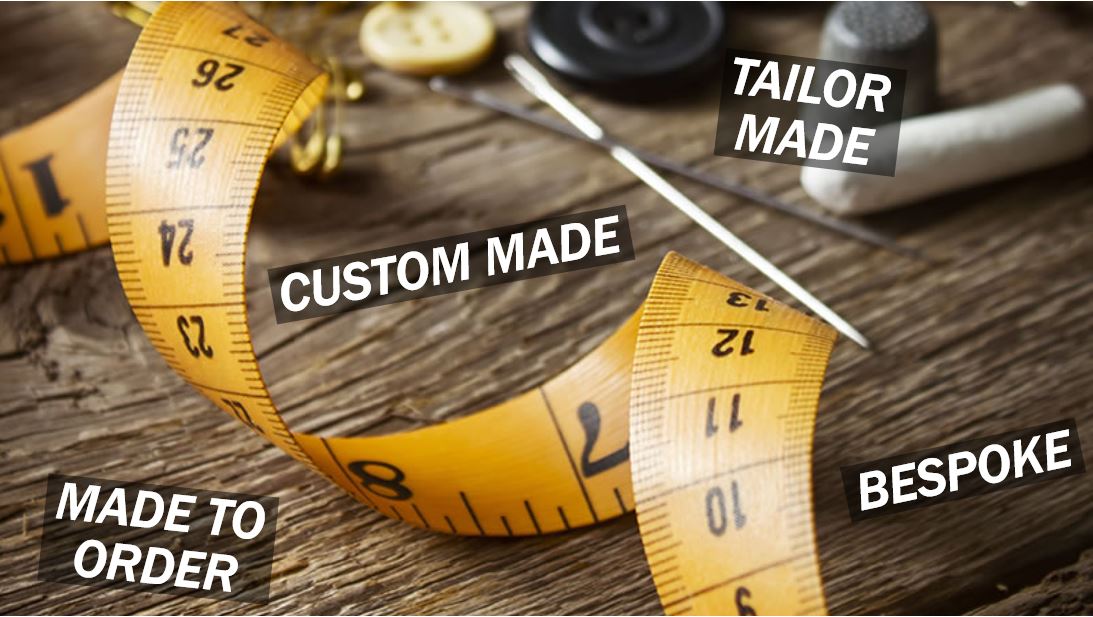If something is Custom Made, the seller creates it according to the instructions or preferences of a specific customer. If the customer asks me for something that is slightly different to what I have in stock, I might tell him that I can create it for him and that it will cost more. In other words, I’ll tell him that if it is custom made it will be more expensive. Custom made comes under the umbrella term customization.
 We also use the terms tailor made, made to order, and bespoke when referring to items we create specifically for one customer.
We also use the terms tailor made, made to order, and bespoke when referring to items we create specifically for one customer.
The Longman dictionary has the following definition of the term custom made:
“Designed or built specially for a particular customer and being different to other things of the same kind.”
Custom made vs. custom-made (hyphen or not)
If the term is followed by a noun, i.e., when it is an adjective, we place a hyphen. When ‘made’ is the passive of ‘make,’ we don’t use a hyphen. Look at these two sentences:
“That is a custom-made item.”
Custom-made is the adjective for the noun item.
“That item was custom made.”
The word made is the past participle (passive form) of make.
Custom made vs. hand made
Some people use the two terms interchangeably. They shouldn’t because their meanings are quite different.
-
Handmade
If something is handmade, it means that you did not use a machine to make it. You used just your hands. For example, if you knitted a sweater yourself, by hand, without using a knitting machine, it was hand made.
A handmade item might not be custom made. If I knit sweaters and sell them to a shop, which then sells them to the general public, they are not custom made. I have not made them for specific individuals.
-
Custom-made
In this case, you know who is going to buy it before you begin to make it. Let’s imagine that Henry asks me to knit a blue sweater for him with red sleeves. We agree on a price of $40. I make that sweater just for him. That is a custom-made item.
Even if I use a knitting machine to make the blue and red sweater for Henry, it is still custom made, even though it is not hand made.
Handmade items may or may not be custom made, and vice-versa.
Mass produced items
When goods are mass produced, they are made as quickly and cheaply as possible and in large numbers. The maker does not know who the customers will be. The general public buys them.
A mass-produced item contrasts with a custom-made one.
Custom-made medicine
In custom-made medicine, also called precision medicine, P4, stratified medicine, personalized medicine, and bespoke medicine, patients are separated into different groups. Medications are made specifically for those groups because doctors know how they are likely to respond.
We also use the term for medical devices, i.e., devices that a manufacturer makes specifically for a group of patients or just one individual. In a Market Business News article, we write about Tilly Lockey and how prosthetics were created specifically for her – they were custom made.
Wikipedia says the following regarding personalized medicine:
“The term has risen in usage in recent years given the growth of new diagnostic and informatics approaches that provide understanding of the molecular basis of disease, particularly genomics. This provides a clear evidence base on which to stratify (group) related patients.”
The advent of 3D printing technology has revolutionized the concept of custom-made items, allowing for intricate and precise personalization previously unattainable through traditional manufacturing methods.
3 Videos
The following educational videos, available on our affiliated YouTube channel Marketing Business Network, provide clear and easily understandable explanations of the terms ‘Custom Made,’ ‘Customization,’ and ‘Made to Order’ using straightforward language and practical examples.
-
What is Custom Made?
-
What is Customization?
-
What is Made to Order?
